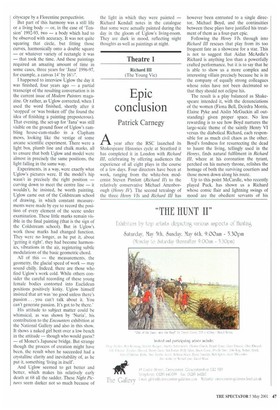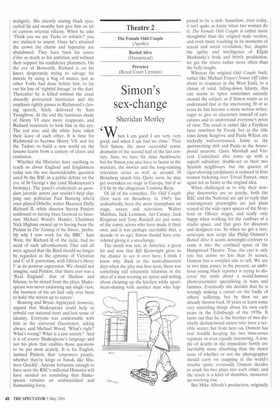Theatre 1
Richard III (The Young Vic)
Epic conclusion
Patrick Camegy
Ayear after the RSC launched its Shakespeare Histories cycle at Stratford it has completed it in London with Richard III, celebrating by offering audiences the experience of all eight plays in the course of a few days. Four directors have been at work, ranging from the white-box modernist Steven Pimlott (Richard II) to the relatively conservative Michael Attenborough (Henry 111. The second tetralogy of the three Henry VIs and Richard III has
however been entrusted to a single director, Michael Boyd, and the continuities between these plays have justified his treatment of them as a four-part epic.
Following the Henry Hs through into Richard III rescues that play from its too frequent fate as a showcase for a star. This is not to suggest that Aldan McArdle's Richard is anything less than a powerfully crafted performance, but it is to say that he is able to show us a more complex and interesting villain precisely because he is in the company of equally strong colleagues whose roles have not been decimated so that they should not eclipse his.
The result is a play balanced as Shakespeare intended it, with the denunciations of the women (Fiona Bell, Deirdra Morris, Elaine Pyke and Aislin McGuckin all outstanding) given proper space. No less rewarding is to see how Boyd nurtures the large-scale theme of the saintly Henry VI versus the diabolical Richard, each responsible for as much civil chaos as the other. Boyd's fondness for resurrecting the dead to haunt the living, tellingly used in the Henrys, finds natural fulfilment in Richard III, where at his coronation the tyrant, perched on his nursery throne, relishes the homage of both the surviving courtiers and those mown down along his route.
Up to this point McCardle, who recently played Puck, has shown us a Richard whose comic flair and lightning swings of mood are the obedient servants of his
malignity. His intently staring black eyes, curled lip and swarthy hair give him an air of cartoon oriental villainy. When he asks Think you we are Turks or infidels?' you are inclined to assent. Once he's attained the crown the charm and hypocrisy are abandoned. They have been his raison d'être as much as his ambition and without their support his confidence plummets. On the eve of Bosworth, Richard is on his knees desperately trying to salvage his morale by using a bag of stones, just as other Yorks had done before him, to lay out his line of 'rightful lineage' in the dust. Thereafter he is killed without the usual absurdly protracted histrionics and the emphasis rightly passes to Richmond's closing speech, finely delivered by Sam Troughton. At the end the luminous shade of Henry VI once more reappears, and Richard resurrects to look him in the eye. The red rose and the white have taken their leave of each other. It is time for Richmond to become Henry VII and for the Tudors to build a new world on the lessons learnt from a century of chaos and confusion.
Whether the Histories have anything to teach us about England and Englishness today was the not inconsiderable question aired by the RSC in a public debate on the eve of St George's day (and Shakespeare's birthday). The panel's credentials as quondam juvenile actors just couldn't help slipping out: politician Paul Boateng who'd once played Othello, writer Maureen Duffy Richard II, while director Steven Pimlott confessed to having been Gertrud to historian Michael Wood's Hamlet. Chairman Nick Higham owned up to having been the Pedant in The Taming of the Shrew, 'probably why I now work for the BBC'. Sam West, the Richard II of the cycle, had no need of such advertisement. One and all were agreed that the Bard should no longer be regarded as the epitome of Victorian and C of E patriotism, with Olivier's Henry V as its postwar expression. We should not imagine, said Pimlott, that there ever was a 'Real England', that of Shallow and Silence, to be mined from the plays. Shakespeare was never endorsing any single view; the business of his art had only ever been to hold 'the mirror up to nature'.
Boateng and Bryan Appleyard, however, argued that Shakespeare could help us rebuild our national story and lost sense of identity. Everyone was comfortable with him as the universal Questioner, asking always, said Michael Wood, 'What's right? What's wrong? What is a just society?' And it is of course Shakespeare's language and not his plots that enables those questions to be put most acutely. It is his English, insisted Pimlott, that 'empowers people, whether they're kings or bawds like Mistress Quickly'. Anyone fortunate enough to have seen the RSC's millenial Histories will have needed no reminding that Shakespeare remains an undiminished and humanising force.











































































 Previous page
Previous page